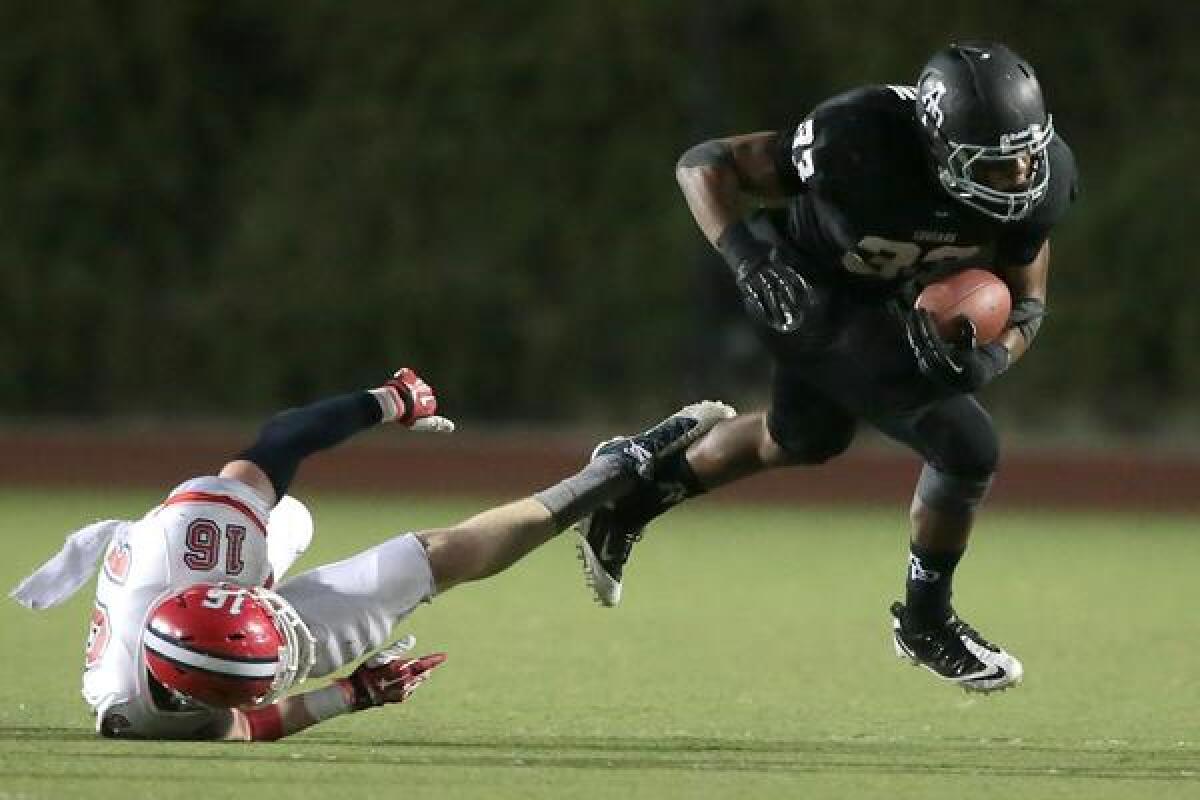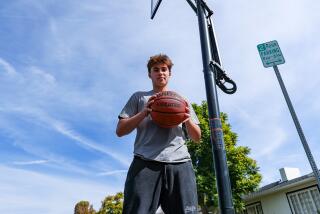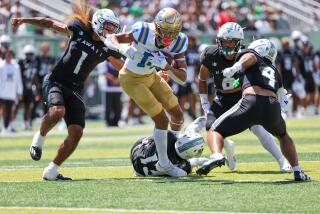Once abandoned, Terrell Watson survives and thrives at Azusa Pacific

The knock came on an afternoon in early September 1993, after Billy Watson returned home from the Los Angeles County Fair.
“I opened the door and there was a baby in a little carrier on the doorstep,” Watson recalls. “It was like something you see in the movies. Then I stepped outside and saw this girl running across the street. It was my daughter.”
At first, Watson was mad. He and his wife, Janice, had their hands full with a 3-year-old son, Billy Jr. Now their troubled 15-year-old daughter was leaving them her infant son — their grandson.
Then Billy picked up the little boy and his paternal instincts kicked in.
“We decided we were going to take care of him, and we have ever since,” says Watson, 58, a carpenter for 40 years.
The boy was named Terrell, and he grew up to be a star running back at Oxnard High and now at Azusa Pacific University.
“I have no regrets, because Terrell is such a good kid,” Watson says. “I’m proud of him, because he’s come a long way and overcome so much.”
Jackie Slater, a former tackle who played 20 seasons with the Los Angeles and St. Louis Rams and is now the offensive line coach at Azusa Pacific, compares Terrell Watson to Walter Payton, Eric Dickerson and Marshall Faulk.
To Watson, a 6-foot-2, 230-pound junior who has been chewing up yards like a rototiller, those names might as well be Manny, Moe and Jack.
“The NFL has never been in my mind,” Watson says after a practice. “I don’t even watch NFL football. My teammates talk about players and I have no idea who they are.”
It’s not that Watson doesn’t want to play in the NFL. It’s just never been his dream.
Since he was a little boy, playing cops and robbers, Watson has wanted to be on a Special Weapons and Tactics (SWAT) team. His plan after college is to enroll in the Los Angeles Police Academy, though he might put that on hold for football.
“I would love to play in the NFL, and if it happens, great,” says Watson, 20. “But I know that only 1% of college players reach the NFL. If it doesn’t happen, I’m not going to sit and mope about it. I know what I want to do.”
Watson is facing NCAA Division II competition playing for Azusa Pacific, but Slater, who played three seasons at Jackson (Miss.) State with Payton and spent five years blocking for Dickerson, says he has “no doubt” Watson could play in the NFL.
“He has a blend of power and explosiveness that makes him a real sleek and dynamic back,” Slater says. “He’s rugged. He’s elusive if he has to be, unless he’s going to compromise yards. Then he will run you over.”
Watson has run for 1,582 yards and 18 touchdowns this season, including a school-record 302 yards and five touchdowns against Simon Fraser on Oct. 12.
Watson’s work ethic reminds Slater of Payton, his personality and demeanor remind him of Dickerson — “He’s very confident and very humble,” Slater says — and his football instincts remind him of Faulk.
“He understands everything,” Slater says. “He’ll come to the sideline when I’m making adjustments with the line and say, ‘This is what they’re doing, Coach. These two guys are coming here, they’re in this kind of coverage,’ and I’m thinking, ‘Let me sort his out, young man; that’s my job.’ ”
Christian Okoye, the former Kansas City Chiefs running back who holds many of the school records Watson has broken or is about to break, believes Watson can play in the NFL if he improves his speed. Watson runs a 4.5-second 40-yard dash — good for Division II, subpar for the NFL.
“He has the physical tools, the body,” says Okoye, who lives in Rancho Cucamonga and has attended several Cougars games. “He’s not a lightning-speed guy, but I know he can get faster with work.”
NFL scouts must measure Watson against Division I backs facing stiffer competition and determine how his skills project to the next level.
The Cougars are in the third year of a three-year transition from NAIA to Division II, in which schools have a maximum of 36 scholarships. After going 4-7 in 2012, Azusa Pacific is 8-2 entering Saturday’s regular-season finale, a rematch against Simon Fraser.
“He could play at USC, UCLA, anywhere,” Slater says. “I think he’ll have an opportunity to be successful in the NFL because he has the physical tools and the intangibles you need.”
Watson’s head, despite the records and NFL talk, fits quite comfortably in his helmet.
“There’s always something I could get better at — holding onto the ball, footwork, reading blocks, knowing my assignments,” Watson says. “Personally, I don’t think I’m there right now. There are a lot of running backs who are better.”
Terrell was 2 weeks old when Billy and Janice Watson adopted him. He met his birth father, who died when Terrell was 12, once. He said he’s “not really in touch” with his mother, who had two other children — a girl, now 19, and a boy, 14 — who were adopted by Billy and Janice.
Terrell has a slight speech impediment that hindered him as a child, and he was placed in many remedial-level classes. By the time he emerged as a football prospect, rushing for 2,905 yards and 37 touchdowns as a senior at Oxnard High in 2010, it was clear he would not meet the academic requirements to play Division I. He wasn’t even recruited.
“When I was in high school,” Watson says, “I never thought about playing college football.”
But that January, Azusa Pacific offensive coordinator Rudy Carlton saw Watson rush for 114 yards in the East-West All-Star Game and invited Watson to visit the Christian college, which sits at the base of the San Gabriel mountains.
“I had no idea where the school was,” Watson says. “But the first day I walked onto campus, I said, ‘I’m coming here.’ I committed that day. I love it here. If I wasn’t at a faith-based school, I’d probably fall off the edge.”
Instead, Watson is thriving. The sociology major has a 2.8 grade-point average. With 3,442 yards in three seasons, he’s on pace to shatter Okoye’s career rushing record of 3,569 yards.
“For a guy like Terrell, it’s a perfect combination,” says Victor Santa Cruz, Azusa Pacific head coach. “He’s growing into an NFL-caliber player, and we’re helping to mentor him to be a man he can be proud of.”
To Billy Watson, the second part of that mission has been accomplished. He has seen his grandson mature into a successful, self-sufficient and resourceful young man, one with a plan.
“He’s the kind of kid you can drop off at the North Pole with no clothes, and he would get back home with a suitcase full of clothes and money,” Billy Watson says. “And he wouldn’t do anything bad to get it.”
Twitter: @MikeDiGiovanna
More to Read
Go beyond the scoreboard
Get the latest on L.A.'s teams in the daily Sports Report newsletter.
You may occasionally receive promotional content from the Los Angeles Times.











